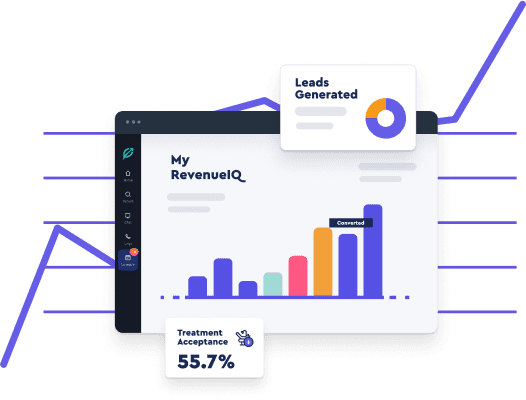AI in Dental Practice Management: The Future of Dentistry

AI is changing the game in dental practice management. From the front desk to diagnostics, it’s making everything faster, smarter, and more efficient.
Let’s start with admin tasks. AI tools—like virtual assistants—can now handle appointment reminder scheduling, reminders, and follow-ups.
That means fewer no-shows, less paperwork, and more time for your staff to focus on what really matters: patient care. But AI isn’t stopping there.
It’s also stepping into diagnostics. Tools use AI to analyze X-rays and scans, spotting cavities or gum disease before they become serious. This early detection means more accurate diagnoses, personalized treatment plans, and better long-term results.
And since AI can track trends in patient data, it helps predict future oral health issues too.
The result? Faster decisions. Happier patients. And a more profitable practice.
AI isn’t just a tech upgrade—it’s a total game-changer for modern dental care.
How has AI in Dental Practice Management Changed the Field?
AI is transforming how dental practices run. What used to be manual and time-consuming is now faster and more efficient.
With tools like digital imaging systems and smart systems, AI helps streamline operations, improve diagnostic accuracy, and make patient communication smoother.
The result? A better experience for both dentists and patients. Let’s discuss how it has completely changed the field.
1. Streamlining Appointment Scheduling
AI has significantly improved scheduling efficiency in dental practice management. Conventionally, booking appointments manually can cause double bookings, leading to significant delays for patients and dentists alike. However, with AI-powered scheduling systems, appointments become more organized based on the dentist’s availability, patient preferences, and the duration of treatment. Thus, it allows:
- Reduced waiting times: Automated appointment scheduling ensures optimal time management, leading to shorter wait times and happier patients.
- Organized patient data: AI algorithms analyze large volumes of patient data and make informed decisions regarding optimized treatment plans and personalized care, along with effective treatment recommendations.
- Automated patient communication: AI-powered chatbots effectively manage phone interactions and patient inquiries, providing instant responses, enhancing patient satisfaction and boosting staff productivity, thus improving patient engagement.
- Improved patient outcomes: By proactively addressing potential issues and offering personalized preventive care, AI greatly enhances overall patient experience and outcomes.
By introducing AI in dental practice scheduling, practices can increase efficiency, boost patient satisfaction, and effectively manage resources.
2. Enhancing Billing and Invoicing Accuracy through AI for Dental Office
That’s where AI steps in—automating billing processes, reducing errors, and speeding up admin work. With AI-powered systems, practices can ensure accuracy from start to finish, helping them get paid faster and more reliably.
That’s where AI steps in—automating billing processes, reducing errors, and speeding up admin work. With AI-powered systems, practices can ensure accuracy from start to finish, helping them get paid faster and more reliably.
For example:
| Task | Manual Processing | AI-Augmented Processing |
|---|---|---|
| Claims Processing | Prone to errors due to manual input | Accurate & automatic data processing |
| Insurance checks | Lengthy review process | Instant verification process |
| Payment Reminders | Employee-dependent might be missed | Automatic reminders for every invoice |
AI streamlines billing procedures, ensuring appropriate fee allocation, avoiding critical errors, and improving revenues by reducing the chances of denied claims. In an industry where financial accuracy and timeliness are paramount, AI-based systems provide invaluable support.
3. Personalized Communication through AI-powered Tools
AI is changing how dental practices communicate—with speed, ease, and a personal touch.
No more waiting on hold. Chatbots on websites and apps let patients book appointments, ask questions, or check aftercare anytime, day or night. Smart speakers make it even easier—just ask about your next visit or get oral care tips hands-free.
Even better? AI sends appointment reminders and advice tailored to your needs. It’s a smarter, faster way to stay on top of your dental health.
4. Improved Diagnostic Precision through AI Automation for Dentists
AI takes diagnostics and treatment planning to the next level through seamless integration in the United States. By scanning through tons of patient data, AI can provide valuable insights that spot tiny issues that might slip past the human eye—think early-stage cavities or subtle gum disease.
It doesn’t stop there. AI tools also analyze trends and history to recommend personalized treatment plans, making dental care smarter and more effective.
Here’s a quick look at how AI stacks up against traditional methods:
| Task | Manual Process | AI-Enhanced Process |
|---|---|---|
| Data Analysis | Time-consuming and prone to errors | Fast, precise, and efficient |
| Diagnostic Accuracy | Dependent on human expertise and hence varies in efficiency | AI algorithms offer higher accuracy |
| Treatment Planning | Risk of oversight | AI recommendations based on specific data |
The AI system’s adaptability and continuous learning make it a powerful tool for improving diagnostic accuracy and planning treatment. While aiding in diagnosis, AI also helps streamline workflows and reduce human error, providing consistent and reliable results.
5. Automation of Routine Administrative Tasks through Dental Practice AI
Incorporating AI in administrative tasks in a dental practice brings a major change in overall efficiency for dental professionals. Here’s how:
- Appointment Scheduling: AI automatically finds times that work for both the dentist and the patient, saving time and eliminating the need for a phone tag.
- Patient Record Management: AI digitizes and organizes patient records, making them easy to access quickly, so there’s no need to dig through paper files.
- Billing and Inventory Management: AI detects billing errors and tracks supplies (like fillings or floss) to prevent shortages, ensuring smooth patient care without interruptions.
By handling these tasks, AI frees up dental staff to focus on what matters most—providing top-notch care for patients. It’s a major boost in efficiency!
How is AI Transforming Treatment Planning in Dental Practices?
AI is reshaping how dental treatment plans are created—making them more personal and precise.
By analyzing patient data like medical history, lifestyle, and even genetic info, AI suggests treatment options that are truly tailored. It’s like having a second expert opinion built right into your system.
And the best part? AI keeps learning. So, the more it’s used, the better it gets—helping dentists offer top-notch, evidence-based care that evolves with every patient.
1. AI in Oral Health Assessment and Risk Evaluation through Dental Office AI Platform
Analyzing Patient Data: Artificial intelligence can look at all sorts of data—like dental records, X-rays, and even genetic info—to spot risks like cavities, gum disease, or potential future issues.
- Analyzing Patient Data: Artificial intelligence can look at all sorts of data—like dental records, X-rays, and even genetic info—to spot risks like cavities, gum disease, or potential future issues.
- No More Human Errors: AI helps eliminate mistakes in analyzing all that data, so dentists can trust the results and make better decisions. By automating routine and repetitive tasks, AI further enhances the accuracy of these analyses.
- Personalized Treatment Plans: By crunching all that data, AI helps dentists create treatment plans that are specifically tailored to each patient, whether it’s for a routine cleaning or more complex procedures like implants.
- Preventive Care & Better Outcomes: AI spots potential problems early, making it easier to prevent them. This means fewer emergency visits and better long-term oral health.
Ultimately, using AI for risk assessments means better care, fewer surprises, and happier, healthier patients who trust their dentist even more.
2. Predictive Analytics for Proactive Care
AI is changing the game when it comes to staying ahead of dental problems. Here’s how:
- Predicting Issues Early: By looking at past patient data, like previous dental visits or X-rays, AI can predict future problems before they get serious—like spotting early signs of cavities or gum disease before they become a bigger deal.
- Trends & Patterns: AI looks for patterns in a patient’s history and trends in their dental health, so dentists can spot risks, like if a patient has a family history of oral health issues, and take action early.
- Personalized Care Plans: With this predictive power, dentists can create tailored care plans to prevent problems down the road, helping patients avoid costly treatments in the future.
- Better, Cheaper Care: By catching issues early, patients get less invasive treatment and better long-term outcomes, while saving on costs and stress.
In short, AI helps dentists anticipate what their patients will need, making it easier to prevent problems, keep costs down, and ensure healthier smiles for the long haul.
Marketing and Customer Engagement: How AI is Revolutionizing the Field?
AI is making waves in dental marketing too.
By digging into data from patient records and social media, AI can help craft targeted marketing strategies that actually reach the right audience. It’s like having a smart assistant who knows exactly what your patients care about.
Plus, it doesn’t stop there—AI tools also analyze reviews and feedback to help dental practices understand patient sentiment and improve services. Smarter engagement, happier patients.
1. AI-driven Social Media Strategies
AI is changing the game when it comes to staying ahead of dental problems. Here’s how:
- Predicting Issues Early: By looking at past patient data such as previous dental visits or X-rays, AI can predict future problems before they get serious—like spotting early signs of cavities or gum disease before they become a bigger deal.
- Trends & Patterns: AI looks for patterns in a patient’s history and trends in their dental health, so dentists can spot risks, like if a patient has a family history of oral health issues, and take action early.
- Personalized Care Plans: With this predictive power, dentists can create tailored care plans to prevent problems down the road, helping patients avoid costly treatments in the future.
- Better, Cheaper Care: By catching issues early, patients get less invasive treatment and better long-term outcomes, while saving on costs and stress.
In short, AI helps dentists anticipate what their patients will need, making it easier to prevent problems, keep costs down, and ensure healthier smiles for the long haul.
2. Enhancing Online Presence and SEO with AI Tools
Using AI tools for beneficial online presence and SEO optimizes the website’s search engine visibility. By incorporating insights from AI tools, dental practices can better understand what potential patients are searching for. AI copywriting tools can generate high-quality, relevant keywords and content quickly and cost-effectively, updating service pages, blog posts, and other website content regularly. For example, ChatGPT can swiftly generate keyword-optimized content to attract more visitors to the website with SEO practices like:
| SEO elements | Contribution |
|---|---|
| Keyword research | AI can identify optimal keywords to target in website content |
| Content optimization | AI tools consistently improve the website’s content |
| Performance Tracking | AI monitors SEO performance regularly |
The delivery of valuable, optimized, and engaging content not only boosts website traffic but also reinforces the authority of the dental practice, educates patients, and provides a positive experience, thus amplifying trust & loyalty.
How to Choose the Right Dental Practice Management Tool for your Practice?

Choosing the right dental practice management tool involves considering several key factors. Practice by Numbers (PbN) offers a comprehensive solution that integrates analytics, CRM, marketing, and operations all in one platform. When selecting a tool, you should look for:
- Comprehensive Analytics: PbN provides deep insights with tools like Practice IQ, which helps in making data-driven decisions by tracking over 600 KPIs. This helps you optimize practice performance and patient care.
- Patient Relationship Management: Features like automated reminders, two-way texting, and online booking ensure smoother patient interactions, boosting satisfaction and retention.
- Streamlined Operations: PbN’s features like insurance verification, patient forms, and Kiosk check-ins save time and reduce administrative burdens, allowing your team to focus more on care.
- Scalability: Whether you run a single practice or multiple offices, PbN scales to fit your needs, making it a good choice for growing practices.
- Transparency and Support: Ensure the tool offers clear, ongoing support and updates, so you can continue optimizing your practice as technology evolves.
By focusing on these features, you can select a practice management tool that enhances both operational efficiency and patient experience. Get a Demo today!
Frequently Asked Questions
What are the challenges of integrating AI in existing dental systems?
As we embrace this AI-led revolution, it is essential to navigate through associated challenges, such as ensuring patient privacy and data protection, addressing issues of cost and complexity, managing fears about replacing human expertise, and the necessity of continuous learning to keep up with this advancing technology. Ethical considerations and obtaining patient consent are also paramount when integrating AI.
Is patient data secure when AI tools are used in dental practice management?
Yes, when using AI tools in dental practice management, data security and sensitive patient data are top priorities. Reputable AI solutions adhere to strict data protection regulations, like HIPAA, ensuring that patient information is encrypted and stored securely. It’s crucial to choose AI systems that are transparent about how they protect patient data and comply with relevant privacy laws.
How can AI improve the efficiency of managing patient appointments in a dental practice?
AI can streamline appointment scheduling by automatically analyzing the dentist’s availability and patient preferences. It can handle booking, rescheduling, and sending reminders, reducing the need for manual coordination. This not only saves time but also minimizes errors like double-booking, leading to a smoother experience for both patients and staff.
How does AI improve patient management in dental practices?
AI enhances patient management by automating administrative processes and offering personalized patient communication that meets patient needs, leading to increased patient satisfaction. AI’s predictive analysis assists in early diagnosis, promoting proactive dental care and better treatment outcomes.




